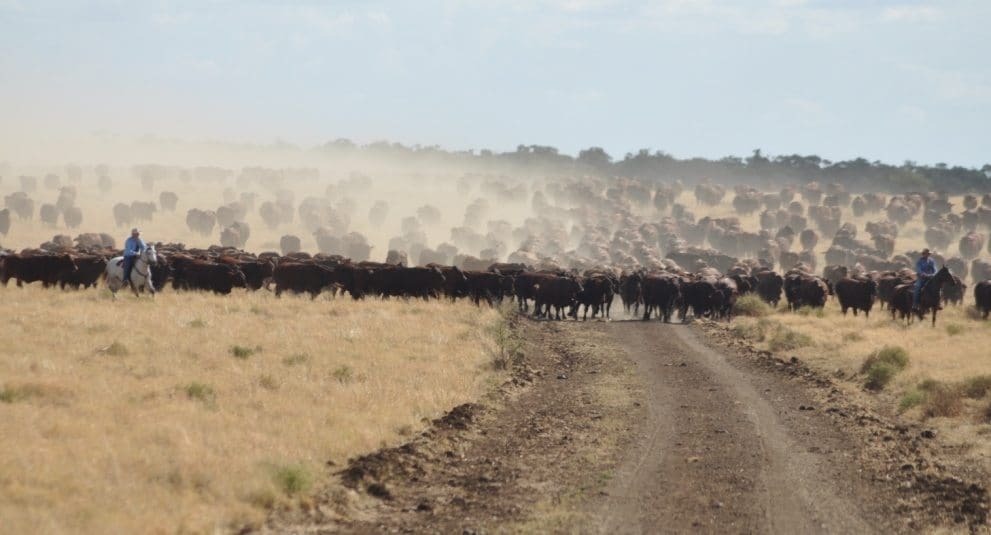
THE scope for pastoral diversification in Western Australia’s Kimberley/Pilbara region has been limited by outdated land tenure laws that are now being overhauled by the WA state government.
The new form of land tenure known as the ‘Rangelands Lease’ follows years of lobbying by pastoralists who could see that future sustainable development of the WA pastoral estate would be restricted unless changes were made.
Announcing the proposed Rangelands Lease last month, WA Lands Minister Terry Redman hoped it would create new opportunities to encourage more people to live in the rangelands region, improving economic, social and land management outcomes.
“The act is very old and is constraining pastoral diversification, such as tourism, conservation and more intensive irrigated agriculture. These changes are aimed at improving security of tenure for WA pastoral lessees, increasing the value of pastoral leases, allowing for more diverse land uses and unlocking the potential of the state’s rangelands,” Mr Redman said.
Pastoral leases make up about one third of WA’s rangelands, which cover 87 percent of the state’s landmass. Unallocated crown land, unmanaged reserves, the conservation estate and other tenure make up the remainder.
A ‘lot to like’ about new tenure
Pastoralists in the Kimberley say the proposed Rangelands Lease is promising, and there is a lot to like.
Kimberley/Pilbara Cattlemens Association executive officer Catherine Marriott, said the intention was very positive.
“It is encouraging that the state government wants to make diversification easier. However, there are still a lot of unanswered questions,” she said.
“The devil is in the detail, according to Anne Marie Huey from Dampier Downs Station, who chairs the WA Pastoralists and Graziers Association’s Kimberley Division.
She said most of the proposals are positive and what the industry has been seeking for a long time.
Right of lease renewal key point
Tony Seabrook, the president of the Pastoralists & Graziers Association – the lobbying arm of the KPCA – said the pivotal point was the right of renewal.
“The state government is aware that to get serious pastoral industry investment, a better form of security needs to be put in place – and an automatic right of renewal goes a long way towards achieving that,” he said.
However Mr Seabrook said the state government was wrong in believing that the Rangelands Lease would invigorate the pastoral industry.
“There’s not much in the new legislation that you can’t already do. The reality is that most pastoralists are happy to keep doing what they are doing, and are not interested in diversifying into other forms of agriculture.”
Mr Seabrook cited the concerns of a successful vegetable grower from Carnarvon. “He is paying huge rates on valuable land and is worried about how he will compete against people who are paying less for a rangelands lease or a pastoral lease to produce the same product.”
He fears the WA government may vary rental charges based purely on what a person has nominated as the use for that land. More productive use of land may simply incur more costs.
“You are turning land that was once rented at a nominal figure, based on its capacity to produce livestock, into land that has the capacity to produce a crop of much greater value. A leasee can’t expect to rent it from the government at the same level that they might for land listed for livestock production.”
Mr Seabrook said one of the most frustrating things had been the failure of the Lands Department and Minister Redman to meet with the biggest capital investors in the industry – pastoral leaseholders – and ask them what they wanted.
Ms Marriott agrees.
“The potential for investment in the Kimberley is absolutely massive, and it is imperative this new form of tenure is well thought-through, that pastoralists are engaged, and that red tape is reduced.”
Ms Marriott said properties holding the Rangelands Lease would not become more attractive to potential investors because of the risk with a short tenure of just 49 years.
She said the feeling from pastoralists at the moment was that they would stick to their pastoral leases.
One industry source suggested that no existing pastoralist making a profit out of the cattle business would apply for a Rangelands Lease.
“A Rangelands Lease is beneficial if you want to destock and diversify into tourism. You can’t do that on the current pastoral lease. There appears to be little benefit if you are running a cattle business that’s viable and profitable.”
Ms Huey said the biggest problem with the current diversification permit system was that it specifically prohibited third party investment and reforms would make it easier for property owners to diversify.
“Under a Rangelands Lease, an investor could establish a hay growing operation on a pastoral property much more easily. Another positive is that diversification permits would be transferred when a property is sold, improving the security of investment and opening up the opportunity for more pastoralists to try different business models.”
Ms Marriott said it was too early to say whether property prices would rise as a result of the reforms, but Ben Farquhar from Opteon Property Group in Kununurra believes the Rangelands Lease will make Kimberley properties more attractive and more marketable in an improving market.
“It comes down to the scale of the diversification. A minor, secondary income is not a big issue. Some people have small tourist ventures making a nominal income. However, a major going concern would certainly provide a benefit for prospective property purchasers,” he said.
- In April, the WA Department of Land will hold a series of information sessions to explain the draft Bill in Broome, Halls Creek, Port Hedland, Carnarvon, Kalgoorlie and Perth. Minister Redman is encouraging all stakeholders including pastoralists, industry, conservation, environment and Aboriginal groups to provide comment and feedback.



HAVE YOUR SAY